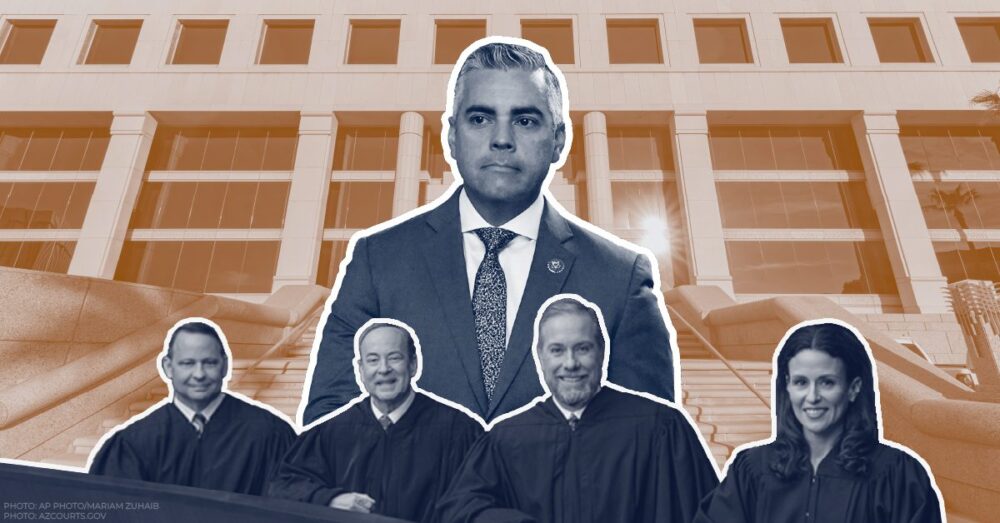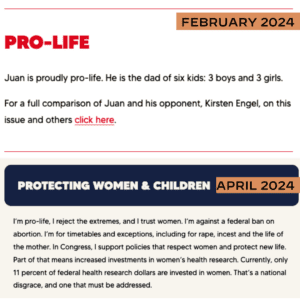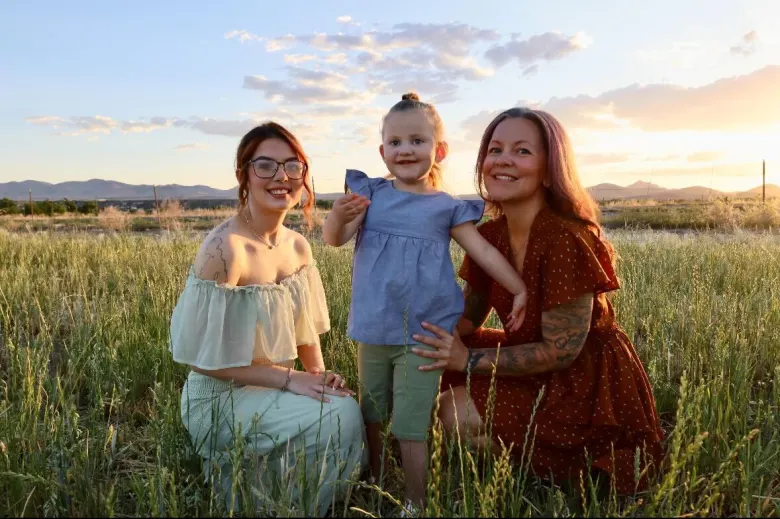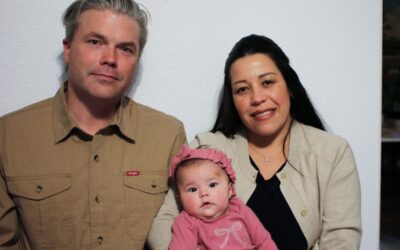
US Rep. Juan Ciscomani, R-Tucson (above), with the four Arizona Supreme Court justices who ruled to reinstate an 1864 abortion ban. (From left to right) Justices John R. Lopez IV, Clint Bolick, James P. Beene, and Kathryn H. King were all appointed while Ciscomani was responsible for vetting judicial nominees from 2015 - 2022. Design by Francesca Daly / COURIER.
A Tucson congressman who helped supervise the appointment of five anti-abortion justices to the Arizona Supreme Court now appears to be a victim of his own success, criticizing the court Monday for their decision to reinstate an 1864 total ban on abortion.
“The law is archaic,” Republican US Rep. Juan Ciscomani told Arizona Public Media. “We need voters and input from our community of this century, having input on that law; not from 1864. I was critical of that. And you can read my statement on that as well. That was not good for women—not good for providers—to be under that.”
Support for abortion ban
Ciscomani’s most recent statement regarding Arizona’s total ban on abortion care aligns with the sentiment of most Arizonans. A poll conducted by Mercury Analytics for the nonprofit NewDEAL found that 60% of voters want government protections for reproductive healthcare, and less than 10% were strongly against any such protections.
But the first-term congressman’s recent characterization of the ban’s reinstatement as a “disaster for women” marks a departure from his work before he was elected to the US House. Prior to elected public service, Ciscomani worked as a high-level advisor in former Gov. Doug Ducey’s administration for nearly a decade, meeting with him weekly and one of four staffers tasked with vetting judicial nominees before the judges were reviewed by the governor.
All four of the justices who voted to reinstate the 1864 ban were appointed while Ciscomani worked in this capacity. A fifth sitting justice, Bill Montgomery, was also appointed by Ducey but recused himself from the abortion ban ruling because his extreme bias against abortion healthcare was made public.
Kirsten Engel, a former state legislator and current Democratic candidate vying to replace Ciscomani in Congress, said her opponent’s careful clarification regarding the 1864 ban should not be mistaken for a reversal in ideology.
“This is frankly no surprise. Juan Ciscomani has been trying to restrict and ban abortion since he first sought public office, he is still doing it, and he will continue to do it,” Engel told The Copper Courier. “Arizona deserves better than an anti-choice charlatan like Juan Ciscomani.”
Ciscomani’s office did not respond to requests for comment on this story.
Ciscomani’s role
From 2015 until shortly before being elected to Congress in 2022, Ciscomani worked within the Ducey administration—first as the director of the governor’s office in southern Arizona, then later as the director of the Sonora office, and as a senior advisor for regional and international state business. At the time, he described himself as “the voice of the governor to Southern Arizona.”
Ciscomani served as a Senior Policy Advisor for Ducey, where he was one of four members of the governor’s staff tasked with vetting judicial applicants, according to reporting from the Arizona Capitol Times. Another staffer tasked with vetting nominees was Kathryn Hacket King, who was appointed to the Arizona Supreme Court in 2021 and voted to reinstate the 1864 abortion ban.
King’s six-year term ends in 2024, and her name will be on the November ballot for retention.
In May 2016, the court was expanded from five justices to seven—against the advisement of then-Chief Justice Scott Bales—and in the next few years, five seats on the high court were given to justices whose records demonstrated adherence to extreme conservative policies, such as extreme restrictions on reproductive healthcare.
One of the justices who were vetted and appointed after the court was expanded—John Lopez IV in December 2016—joined King in the decision to reinstate the total abortion ban, as did fellow Ducey appointees Clint Bolick and James Beene.
“I have the privilege of being part of the Governor’s team who interviews judicial candidates before they meet with him,” Ciscomani said in an October 2016 Facebook post. “We met with 7 outstanding candidates for the AZ Supreme Court. I’m in that room because of Governor Ducey’s commitment to have Southern AZ at the table when making key decisions that impact our state.”
“Thanks Juan,” Justice Bolick replied to the post. “Looking forward to having two terrific new colleagues.”
Support for total abortion ban baked into15-week law
After remaining consistent for nearly a decade, Ciscomani’s stance on restrictive abortion laws quickly evolved as backlash for the total ban’s reinstatement grew. What was once a short, straightforward two sentences on his campaign website in February, became a nuanced prose of vague platitudes after the court ruling in April.

Screenshots of Rep. Juan Ciscomani’s campaign website before and after the Arizona Supreme Court ruled on April 9, 2024, to reinstate an 1864 law banning abortion services.
In his statement criticizing the total abortion ban, Ciscomani offered support for Arizona’s 15-week ban, signed into law by Ducey in 2022. But neither ban offers exceptions for victims of rape and incest, the only time Ciscomani said he would support abortion services, according to the now-removed candidate survey he filled out for Central Arizona Policy (CAP). CAP, who endorsed Ciscomani in 2022, has fiercely defended the 1864 abortion ban, and has pushed to eradicate abortion healthcare entirely in the state for nearly two decades.
In addition to lacking exceptions for victims of sexual assault, the 15-week ban was written with the intention of going away should the 1864 ban go into effect. Its original sponsor, former state Sen. Nancy Barto, hailed the Arizona Supreme Court’s decision and chided Republican lawmakers like Ciscomani for shying away from their Party’s clearly stated goal of banning abortion entirely.
“Kudos to the Arizona Supreme Court for faithfully interpreting our laws instead of opting for a political ruling. Thank you for upholding our pre-Roe law,” said Barto. “A law that was in force before Roe v. Wade was imposed on America – and intentionally not repealed by the Legislature in the years following. In fact, it was reconfirmed during that time – even in the language of the 15 week bill we passed into law in 2022. Sad to see lawmakers falling all over themselves to ‘fix’ this by now calling for a new 15 week ban.”
Other lawmakers who voted to pass the 2022 law pointed out that it was intended to serve as a placeholder until Roe v Wade was overturned, and support for that law meant support for the total ban.
But despite his current call to go back to the 2022 law, Ciscomani has been emphatic that he would follow whatever law is put in place.“I’m going to abide by the law in the state that I live in, and I live in Arizona,” Ciscomani told the Arizona Daily Star. “So I’m going to support the law here in the state of Arizona.”
Support Our Cause
Thank you for taking the time to read our work. Before you go, we hope you'll consider supporting our values-driven journalism, which has always strived to make clear what's really at stake for Arizonans and our future.
Since day one, our goal here at The Copper Courier has always been to empower people across the state with fact-based news and information. We believe that when people are armed with knowledge about what's happening in their local, state, and federal governments—including who is working on their behalf and who is actively trying to block efforts aimed at improving the daily lives of Arizona families—they will be inspired to become civically engaged.


Arizona Medicaid now covers traditional healing, helping Native communities preserve tradition
PHOENIX – Natasha Bowman is a Navajo doula and student midwife. Her work centers around revitalizing traditional birthing through practices that...

From buddy systems to the ‘Blind Brigade’: Aging alone in Arizona
PHOENIX – Arizona’s population is aging, and more seniors are facing a life alone. “Solo agers” have no family, spouses or lifelong friends who are...

Officials investigating outbreak of Shiga toxin, possible connection to the Arizona State Fair
PHOENIX – The 17-year-old patient, clad in a light blue, patterned hospital gown and her pink and purple bonnet, sat in a hospital chair attached to...

Arizona families in limbo after sharp rise in disability spending strains state budget
PHOENIX – Nine-year-old Faith Todd has Wolf-Hirschhorn syndrome, epilepsy and autism, conditions that put her at constant risk of seizures, choking...





